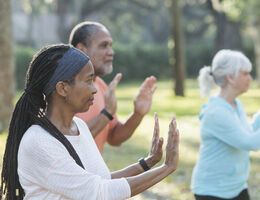6 health benefits of tai chi

Aug. 15, 2024—If you like the idea of a gentle workout that may boost your body and relax your mind, you may want to give tai chi a try.
Tai chi combines slow and gentle, flowing movements with deep breathing—it's sometimes described as "meditation in motion." If you've ever seen a group of people doing what looked like martial arts poses in a park, chances are, that was tai chi.
But tai chi is more than a graceful, meditative practice. Here are just a few of the many ways research suggests tai chi may benefit your physical and mental well-being:
1. Better balance for a lower risk of falls. Tai chi may help older adults and people with Parkinson's disease improve their balance, which may help them avoid falls, according to the National Center for Complementary and Integrative Health (NCCIH). Falls can result in fractured hips or other bones. So avoiding them is important. Learn about other exercises that may help prevent falls.
2. Less stress. The mindfulness side of tai chi—the deep breathing and graceful movements—may help with relaxation and protect against anxiety and stress.
3. Better blood pressure. Tai chi may help lower blood pressure as well as medicine does, in some cases. One recent study found it helped more than aerobic exercise. This may be due to tai chi's ability to relax muscle tone and the heart rate.
4. Improved diabetes control. Regularly doing tai chi has been linked to better blood sugar and A1C levels in people with type 2 diabetes, says the NCCIH. It's worth noting that aerobic exercise offers the same benefits.
5. Less pain. The Arthritis Foundation recommends tai chi to help with knee, hip and back pain. The low-impact exercise helps strengthen muscles around joints, such as knees and hips, as well as in the lower back. Having stronger muscles may help support these structures when you move.
6. Improved memory and thinking. One study of older adults with mild cognitive impairment found that tai chi helped improve their thinking and memory skills, the NCCIH reports.
Give tai chi a try
Would you like to try tai chi? To get started:
- Get your doctor's OK. Tai chi is thought to be safe. But if you have a health condition, it's a good idea to check with your doctor before starting.
- Take a beginner's class from a qualified instructor. Fitness clubs and community centers may offer tai chi classes nearby. Or check one out online—you won't need any special equipment.
- Give it time. Like other exercises, you are likely to benefit more if you do it regularly and over time. Aim for two or three sessions a week over a few months.
Sources
- AARP. "8 Surprising Reasons to Try Tai Chi After 50." https://www.aarp.org/health/healthy-living/info-2024/tai-chi-benefits.html.
- American Academy of Neurology. "Tai Chi May Help Lower Blood Pressure Better Than Aerobic Exercise." https://www.brainandlife.org/articles/tai-chi-may-help-lower-blood-pressure-better-than-aerobic-exercise.
- Arthritis Foundation. "Tai Chi Shown to Ease Back Pain." https://www.arthritis.org/diseases/more-about/tai-chi-shown-to-ease-back-pain.
- National Center for Complementary and Integrative Medicine. "Tai Chi: What You Need to Know." https://www.nccih.nih.gov/health/tai-chi-what-you-need-to-know.
- National Council on Aging. "The Health Benefits of Tai Chi and How to Get Started." https://www.ncoa.org/article/the-health-benefits-of-tai-chi-and-how-to-get-started.
- National Institute on Aging. "Tai Chi, Especially an Enhanced Version, May Improve Cognition in Older Adults With Memory Problems." https://www.nia.nih.gov/news/tai-chi-especially-enhanced-version-may-improve-cognition-older-adults-memory-problems.
